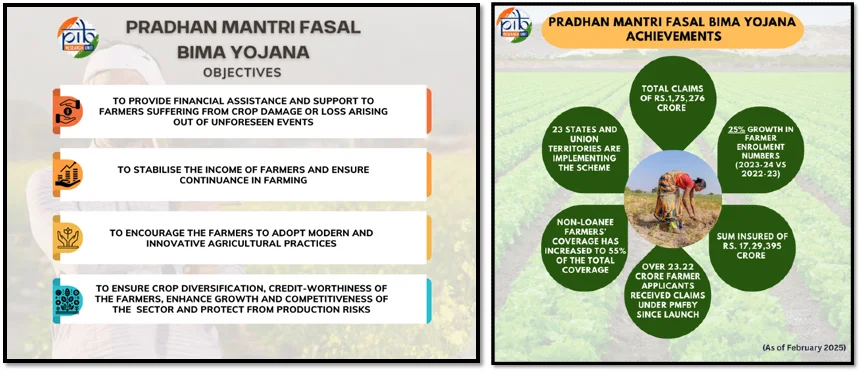Facts for UPSC Mains
Pradhan Mantri Fasal Bima Yojana
- 28 Jul 2025
- 6 min read
Why in News?
The Pradhan Mantri Fasal Bima Yojana (PMFBY) has seen major expansion, but states have defaulted on approx. Rs 6,450 crore in claim settlements since FY20, raising concerns over delays and farmer support.
What is the Pradhan Mantri Fasal Bima Yojana (PMFBY)?
- About: The PMFBY is a government-sponsored crop insurance scheme launched by the Ministry of Agriculture & Farmers Welfare.
- It aims to provide financial support to farmers in the event of crop loss due to natural calamities, pests, or diseases and to stabilize their income.
- Premium: Farmers pay a capped premium of 2% (Kharif), 1.5% (Rabi), and 5% (commercial/horticultural crops).
- The remaining premium is shared between the Centre and States in a 50:50 ratio, and 90:10 for North-Eastern States from Kharif 2020.
- Premium rates depend on crop risk, insured area, and notified crops.
- Key Benefits of PMFBY:
- Broad Coverage: Covers crop loss from natural disasters, pests, diseases, and post-harvest localised events.
- Faster Compensation: Aims to settle claims within two months post-harvest.
- Tech-Based Assessment: Uses satellite, drones, and mobile tech for accurate loss estimation and quick claim settlement.
- Farmer Coverage: The scheme is voluntary and open to all States, Union Territories (UTs), and farmers. For every Rs 100 of premium paid by the farmers, they have received nearly Rs 500 as claims.
- Since 2016, over Rs 1.78 lakh crore has been paid out in claims, which is 5 times the total premium paid by farmers.
- Awareness campaigns like Fasal Bima Saptah and Meri Policy Mere Haath, along with village-level events like Fasal Bima Pathshalas, helped boost participation and close the information gap.
What are the Challenges Affecting the Implementation of PMFBY?
- Large-Scale State Defaults: States like Andhra Pradesh, Rajasthan, and Madhya Pradesh have delayed their premium contributions.
- This has impacted the timely settlement of farmer claims and eroded trust in the scheme.
- Delayed Payouts: Farmers have often faced delays in receiving claims, undermining the scheme’s core objective of timely risk mitigation.
- Assessment Bottlenecks: Manual and outdated crop loss assessment methods have often led to discrepancies and inefficiencies.
- Limited Private Sector Confidence: Repeated payment delays and high claim ratios have deterred some insurance companies from active participation.
- Disparity in Enrollment: Although 4.19 crore farmers were enrolled in 2024–25, categories like tenant (6.5%) and marginal (17.6%) farmers remain underrepresented compared to loanee farmers (48%).
What Measures have been Introduced to Improve PMFBY?
- Digital Reforms: National Crop Insurance Portal (NCIP) developed as a single platform for farmer enrolment, claim tracking, and direct benefit transfer.
- Digiclaim Module operational since Kharif 2022, integrates NCIP with PFMS and insurers’ systems to ensure timely, transparent claim processing.
- A 12% penalty is auto-imposed on insurers for claim delays from Kharif 2024 onwards.
- Crop Cutting Experiments (CCEs)-Agri App captures crop cutting experiment data, directly uploaded to the NCIP.
- YES-TECH (Yield Estimation System Based on Technology), which uses remote sensing to estimate crop yields more accurately.
- From Kharif 2023, YES-TECH became mandatory for paddy and wheat. Soybean was added in Kharif 2024.
- WINDS (Weather Information Network and Data System) expanded the network of weather stations and rain gauges at Gram Panchayat and block level to support yield estimation, drought management, and better insurance products.
- Digiclaim Module operational since Kharif 2022, integrates NCIP with PFMS and insurers’ systems to ensure timely, transparent claim processing.
- Escrow-Based Advance Premium System: From Kharif 2025–26, states must deposit their share of premiums in escrow accounts to ensure timely fund availability.
- Proportional Claim Disbursal: The Centre’s premium subsidy is delinked from state contributions, farmers will now receive at least the Centre’s share of claim irrespective of state default.
|
Drishti Mains Question: Pradhan Mantri Fasal Bima Yojana has improved financial resilience among vulnerable farmers? Discuss. |
UPSC Civil Services Examination Previous Year Question (PYQ)
Prelims
Q. With reference to ‘Pradhan Mantri Fasal Bima Yojana’, consider the following statements: (2016)
- Under this scheme, farmers will have to pay a uniform premium of two percent for any crop they cultivate in any season of the year.
- This scheme covers post-harvest losses arising out of cyclones and unseasonal rains.
Which of the statements given above is/are correct?
(a) 1 only
(b) 2 only
(c) Both 1 and 2
(d) Neither 1 nor 2
Ans: (b)
Mains
Q. Given the vulnerability of Indian agriculture to vagaries of nature, discuss the need for crop insurance and bring out the salient features of the Pradhan Mantri Fasal Bima Yojana (PMFBY). (2016)







